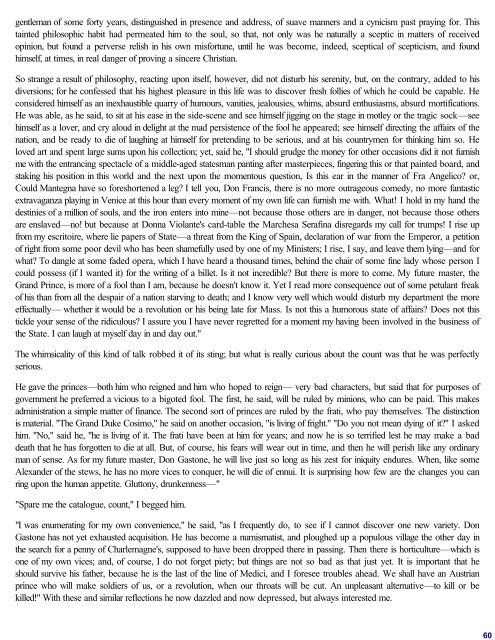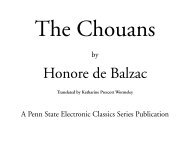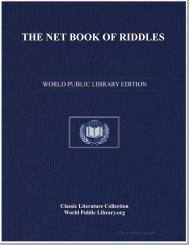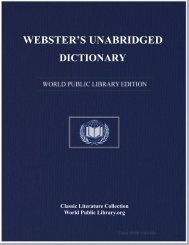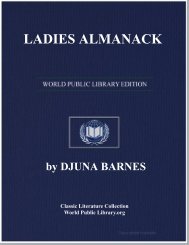THE FOOL ERRANT - World eBook Library - World Public Library
THE FOOL ERRANT - World eBook Library - World Public Library
THE FOOL ERRANT - World eBook Library - World Public Library
You also want an ePaper? Increase the reach of your titles
YUMPU automatically turns print PDFs into web optimized ePapers that Google loves.
gentleman of some forty years, distinguished in presence and address, of suave manners and a cynicism past praying for. This<br />
tainted philosophic habit had permeated him to the soul, so that, not only was he naturally a sceptic in matters of received<br />
opinion, but found a perverse relish in his own misfortune, until he was become, indeed, sceptical of scepticism, and found<br />
himself, at times, in real danger of proving a sincere Christian.<br />
So strange a result of philosophy, reacting upon itself, however, did not disturb his serenity, but, on the contrary, added to his<br />
diversions; for he confessed that his highest pleasure in this life was to discover fresh follies of which he could be capable. He<br />
considered himself as an inexhaustible quarry of humours, vanities, jealousies, whims, absurd enthusiasms, absurd mortifications.<br />
He was able, as he said, to sit at his ease in the side-scene and see himself jigging on the stage in motley or the tragic sock—see<br />
himself as a lover, and cry aloud in delight at the mad persistence of the fool he appeared; see himself directing the affairs of the<br />
nation, and be ready to die of laughing at himself for pretending to be serious, and at his countrymen for thinking him so. He<br />
loved art and spent large sums upon his collection; yet, said he, "I should grudge the money for other occasions did it not furnish<br />
me with the entrancing spectacle of a middle-aged statesman panting after masterpieces, fingering this or that painted board, and<br />
staking his position in this world and the next upon the momentous question, Is this ear in the manner of Fra Angelico? or,<br />
Could Mantegna have so foreshortened a leg? I tell you, Don Francis, there is no more outrageous comedy, no more fantastic<br />
extravaganza playing in Venice at this hour than every moment of my own life can furnish me with. What! I hold in my hand the<br />
destinies of a million of souls, and the iron enters into mine—not because those others are in danger, not because those others<br />
are enslaved—no! but because at Donna Violante's card-table the Marchesa Serafina disregards my call for trumps! I rise up<br />
from my escritoire, where lie papers of State—a threat from the King of Spain, declaration of war from the Emperor, a petition<br />
of right from some poor devil who has been shamefully used by one of my Ministers; I rise, I say, and leave them lying—and for<br />
what? To dangle at some faded opera, which I have heard a thousand times, behind the chair of some fine lady whose person I<br />
could possess (if I wanted it) for the writing of a billet. Is it not incredible? But there is more to come. My future master, the<br />
Grand Prince, is more of a fool than I am, because he doesn't know it. Yet I read more consequence out of some petulant freak<br />
of his than from all the despair of a nation starving to death; and I know very well which would disturb my department the more<br />
effectually— whether it would be a revolution or his being late for Mass. Is not this a humorous state of affairs? Does not this<br />
tickle your sense of the ridiculous? I assure you I have never regretted for a moment my having been involved in the business of<br />
the State. I can laugh at myself day in and day out."<br />
The whimsicality of this kind of talk robbed it of its sting; but what is really curious about the count was that he was perfectly<br />
serious.<br />
He gave the princes—both him who reigned and him who hoped to reign— very bad characters, but said that for purposes of<br />
government he preferred a vicious to a bigoted fool. The first, he said, will be ruled by minions, who can be paid. This makes<br />
administration a simple matter of finance. The second sort of princes are ruled by the frati, who pay themselves. The distinction<br />
is material. "The Grand Duke Cosimo," he said on another occasion, "is living of fright." "Do you not mean dying of it?" I asked<br />
him. "No," said he, "he is living of it. The frati have been at him for years; and now he is so terrified lest he may make a bad<br />
death that he has forgotten to die at all. But, of course, his fears will wear out in time, and then he will perish like any ordinary<br />
man of sense. As for my future master, Don Gastone, he will live just so long as his zest for iniquity endures. When, like some<br />
Alexander of the stews, he has no more vices to conquer, he will die of ennui. It is surprising how few are the changes you can<br />
ring upon the human appetite. Gluttony, drunkenness—"<br />
"Spare me the catalogue, count," I begged him.<br />
"I was enumerating for my own convenience," he said, "as I frequently do, to see if I cannot discover one new variety. Don<br />
Gastone has not yet exhausted acquisition. He has become a numismatist, and ploughed up a populous village the other day in<br />
the search for a penny of Charlemagne's, supposed to have been dropped there in passing. Then there is horticulture—which is<br />
one of my own vices; and, of course, I do not forget piety; but things are not so bad as that just yet. It is important that he<br />
should survive his father, because he is the last of the line of Medici, and I foresee troubles ahead. We shall have an Austrian<br />
prince who will make soldiers of us, or a revolution, when our throats will be cut. An unpleasant alternative—to kill or be<br />
killed!" With these and similar reflections he now dazzled and now depressed, but always interested me.<br />
60


